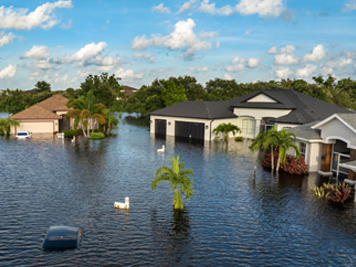The joy of pet ownership—whether cuddling a puppy or observing an exotic reptile—comes with a hidden layer of risks that could turn your beloved companion into a source of unexpected liability.
Impacted by wildfires or winter weather? Whether you have a business that's been affected or your personal home and assets are damaged, know that you have a team of people to support you. Find resources here.
Summary
- Owning pets, whether domestic or exotic, brings joy but also potential risks, including bites, property damage, and other liability concerns.
- Domestic pets can lead to significant liability claims, with dog bites alone resulting in over $1 billion in claims in 2023.
- Exotic pets introduce unique challenges, such as zoonotic diseases and unpredictable behavior, necessitating awareness of specific laws and regulations to avoid legal repercussions.
- Pet owners can reduce their liability risks with appropriate insurance coverage while also implementing risk mitigation strategies to ensure safety and compliance.
Owning a furry, feathery, or scaly pet companion—whether it's a playful puppy, a chattering parrot, or an exotic reptile—can bring joy into your family’s lives. However, beneath the surface of wagging tails, gentle coos, and soft hisses lies a world of potential legal pitfalls that you, as the pet owner, should be aware of and understand. Maybe you’ve already heard real-life tales of a typical, happy-go-lucky pup unexpectedly biting a visitor or an escaped exotic python slithered into a neighbor’s plumbing system, causing property damage.
From the typical risks of owning domestic pets to the unique challenges posed by exotic pets, your responsibilities as a pet owner go far beyond feeding, grooming, and socializing. Understanding all the risks you may encounter as a pet parent is crucial to ensuring your family’s assets and peace of mind are well protected.
When furry friends turn into liability fiends
A simple pounce from your stairs, broken fence, or walk around the block could turn a beautiful day into a nightmare when you or someone else experiences these liability risks with a domestic pet:
1. Bites and attacks
One of the most significant liability risks associated with pet ownership is the potential for dog bites. According to the Centers for Disease Control and Prevention (CDC), approximately 4.5 million people are bitten by dogs each year in the U.S. In 2023, insurers paid out $1.12 billion in liability claims related to dog bites and injuries.
As a dog guardian (or other domestic pet guardian), you can be held liable for injuries, especially if your pet has a history of aggressive behavior. Liability can arise from:
- Medical expenses: You may be responsible for covering the medical costs of the victim.
- Legal fees: If the victim or another pet owner decides to pursue legal action, you may incur substantial legal fees.
- Damages: In cases of severe injury, you may be liable for damages, including pain and suffering.
2. Property damage
Domestic pets can also cause property damage, whether it’s a dog digging up a neighbor’s yard or a cat scratching priceless furniture. If your pet causes damage to your neighbor’s or someone else's property, you may be held liable for the repair costs. This can extend to:
- Damage to personal property, including vehicles, homes, or personal belongings.
- Injury to other pets: If your pet injures another pet, you may be responsible for veterinary bills and other related costs.
3. Lack of adherence to local laws
Some states and local communities may have breed-specific legislation that restricts or bans the ownership of certain dog breeds, that are considered dangerous or aggressive. These laws can vary widely by state and even municipality but often require owners to comply with specific regulations or face penalties. Responsible pet ownership includes being aware of and complying with these laws to ensure the safety of your family, friends, neighborhood, and your pet. If something happens and you own a pet illegally, you could face not only liability claims but also legal charges.
Signs of Caution
- Multiple claims have involved client-owned protection dogs and contractors failing to follow instructions while entering clients’ properties.
- Two specific cases occurred when a contractor entered the premises despite signs warning them to wait (one entered via a garage and another via a fenced yard), where they were immediately taken down by the protection dogs.
- In both instances, the contractors suffered severe injuries, resulting in each receiving five-figure settlements.
When exotic pets become legal pests
While domestic pet ownership is more common, the allure of exotic pets is growing. In fact, ownership of exotic pets has increased by 20 percent in the U.S. over the last decade, with reptiles being the most popular pets to own, along with some mammals such as ferrets and foxes.
Owning an exotic pet presents scales of additional challenges, including:
Zoonotic diseases
Exotic pets may carry diseases that can be passed on to humans. For example, reptiles can carry salmonella, which can lead to serious health issues. If a friend, family member, neighbor, pet sitter, or other visitor contracts a disease from your exotic pet, you may be held liable for medical expenses and other damages.
Injuries
Exotic pets can be unpredictable and may pose a risk of injury. For instance, large birds like cockatoos and macaws can bite, and snakes can constrict. If your exotic pet injures someone, you may face liability claims similar to those associated with domestic pets.
Regulatory compliance
Understanding exotic pet laws is essential for exotic pet owners. Many areas have specific regulations, require permits, and mandate special enclosures. Failure to comply with these regulations can result in fines and legal action. Owners may also be held liable if their exotic pet escapes and causes harm or damage, so it’s wise to review the local laws in your state before purchasing an exotic pet.
These “tails of caution” highlight tragic situations across the U.S. that illustrate what can go wrong when you have an exotic pet.
Protecting your "pack" with insurance
Pet owners should review their current insurance policies to ensure they are protected against pet accidents, injuries, property damage, and other liabilities. Specific insurance to consider for both domestic and exotic pets includes:
Homeowners’ insurance
While most homeowners’ insurance policies cover damage to your house and personal property, they also include personal liability related to pet bites and injuries. It typically covers legal expenses, damages, and medical expenses for the victim if you’re sued and found responsible for damages up to the limit of your policy. Note that some policies also have breed restrictions and/or restriction on coverage with a prior bite history.
Personal excess/umbrella liability insurance
Keep in mind that lawsuits involving serious injuries can potentially be very expensive. Many victims filing claims and lawsuits related to dog bites also include expenses for their medical bills, lost wages, and mental and emotional stress. If the damages or judgment against you exceed the limits of your homeowner’s policy, you may be responsible for the remaining amount. A personal excess or umbrella liability policy can extend coverage beyond your homeowner’s policy limits to help minimize your losses.
Specialized pet liability insurance
This type of liability insurance offers protection against lawsuits resulting from a pet’s actions, covering legal fees, medical expenses, and damages awarded to victims. This can be particularly important for exotic pet owners, as you may face more unique risks and potential injuries associated with your pets.
Ensure purr-fect peace of mind with these risk mitigation tips
While you can’t completely prevent your pet from misbehaving or attacking someone, here are some general tips that can help minimize your liability risks and create a safer environment for your pet:
1. Research the specific needs and behaviors of your pet or breed to ensure you can meet their requirements.
2. Ensure that your pet is legally permitted in your area and that you comply with all local regulations regarding pet ownership.
3. Invest in proper enclosures that are secure and escape-proof (such as fences, cages, etc.) to prevent your pet from getting loose and potentially causing harm.
4. Provide adequate training and socialization for your pet to reduce the likelihood of aggressive behavior.
5. Visit your vet regularly to ensure your pet's health and well-being.
6. Educate yourself and others in your household about the specific risks associated with your exotic pet, including potential bites or injuries.
7. Keep your pet away from children and visitors unless you are confident in their behavior and the safety measures in place.
8. Consider obtaining liability insurance that covers pet ownership to protect yourself financially in case of an incident.
9. Monitor your pet's behavior closely and be proactive in addressing any signs of aggression or stress.
10. Create a safe environment by removing any potential hazards that could lead to injury for both your pet and others.
Engage with an expert pet risk “trainer”
If you currently own pets or are considering adding a fur baby or exotic pet to your family, reach out to an expert risk advisor to ensure you’re adequately protected against all the risks your pet may bring to your household.
Schedule an insurance review with an experienced Personal Risk Advisor to ensure you and your pet are as safe as possible when it comes to your liability risks.



